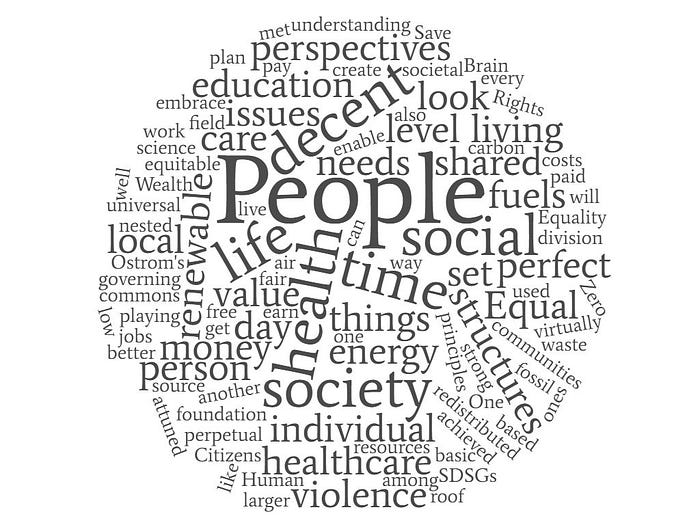Envisioning an Ideal Society — and How to Get There
Survey Respondents Imagine Lifestyles with Greater Opportunity, Meaning, and Balance

By Abby Litchfield
By envisioning the world 50 years from now, researcher Charlene Zietsma says, business leaders can imagine the future they want and brainstorm how to make it a reality. Imagining a perfect society or “utopia” can “free you from constraints,” Zietsma says. Then, the challenge becomes finding ways to make it real, starting now.
To help define that utopia, the Network for Business Sustainability asked its community of business managers and academic researchers to engage in a survey with three questions:
- what a perfect society would look like,
- how their life or work would change, and
- how they or their organization could move toward it.
We received 13 responses, roughly half from researchers and half from consultants and managers, and share highlights below in words and pictures. The word clouds identify the themes in response to each question.
A perfect society is more equal and ecologically sound.

A perfect society provides greater equality and access to opportunity, NBS members said. Almost two-thirds of respondents described it as a society where “every person can have a decent life,” as researcher Elke Schuessler wrote. A decent life means access to resources, like quality health care and education. It can also mean the ability to influence government and other institutions. Researcher Charlene Zietsma, in her survey response, described “Leadership … shared among those with different perspectives.”
A perfect society also is ecologically sound: A third of respondents described a world with significant environmental changes, particularly in the area of energy. “Innovation programs and government subsidies would create virtually free, perpetual energy,” wrote Taryn Mead of Western Colorado University. There will be “zero carbon transport everywhere,” wrote Giulia Cricenti of BSD Consulting.
The UN Sustainable Development Goals can serve as a framework for this society. A quarter of respondents referenced the SDGs specifically, but many more mentioned related concepts. A perfect society is one “that has attained the SDGs,” wrote consultant Bob Willard, who wrote a white paper that outlines what it will take to get there.
In this new world, people will relate in richer ways, respondents said. “There will be mutual respect,” wrote Christine Moser of VU Amsterdam. “Communities will be stronger, with people willingly contributing,” wrote Sal Huddin of Waqia Services. People would have the “opportunity to not just live, but thrive,” wrote Kiera Murphy, a B Corporation consultant.

Our lives will have meaning and balance.

In a perfect society, NBS members expect to have work that is meaningful — but takes less of their time. Almost half of the survey respondents described this kind of shift. “Full-time work [would be] less work,” wrote Tima Bansal of Ivey University, such as a four-day work week.
Additional time could be spent with family and community. “I would be more actively contributing to the community and participating in governance,” wrote Charlene Zietsma in her survey response. “I might be facilitating the civic participation of others.”
Work remains important, especially for those lucky enough to love their profession. But even those respondents would welcome the chance to balance work with other concerns. “My work could almost be the same,” commented Cricenti, “because I work supporting companies with sustainable development. But I could work less hours and also incorporate teaching activities. My family would have more time to be together and travel and less time stressed about work commitments.”
A perfect society would extend a sense of purpose and meaning to everyone. “People [would] contribute based on their talents and strengths,” wrote Stephanie Koonar of Peerspectives Consulting. Respondents may already have comfortable lives, but want others to thrive. “My life wouldn’t change, but others’ lives would,” said Koonar.
Many paths will move us to a perfect society.

For NBS members, utopian ideals are a driving purpose, not just abstract goals. They work toward them professionally — whether in academia or industry — and by modeling ethical behavior.
University faculty use the tools of their scholarship. Through their research, academics can understand best practices for sustainable shifts. Through their teaching and outreach, they can share these insights with those in positions to implement.
Consultants and managers also advocate for change, whether “creating an ESG mindset” (Estela Kurth of PUCRS) or getting a sustainable procurement process underway in companies and government (Willard). Utopian visioning can also be part of this process. “The company I work for could help companies to think about their own utopian scenarios and how they see themselves working towards the future they want,” wrote Cricenti.
Where is business in the perfect society?
The earlier NBS article on imagining utopia focused more directly on the role of business. But in the survey responses, business is less central than “people” — the most common word in the responses to our questions. People living, interacting with family, work, and community; people pursuing health, education, money, and meaning.
With the focus on human experience, institutions such as business and government appear less frequently. This picture might be different if more survey respondents came from the business world.
Perhaps a broader future survey will unpack how businesses can shape and support these visions of “the perfect society.”
A version of this article was published by the Network for Business Sustainability. B The Change gathers and shares the voices from within the movement of people using business as a force for good and the community of Certified B Corporations. The opinions expressed do not necessarily reflect those of the nonprofit B Lab.


